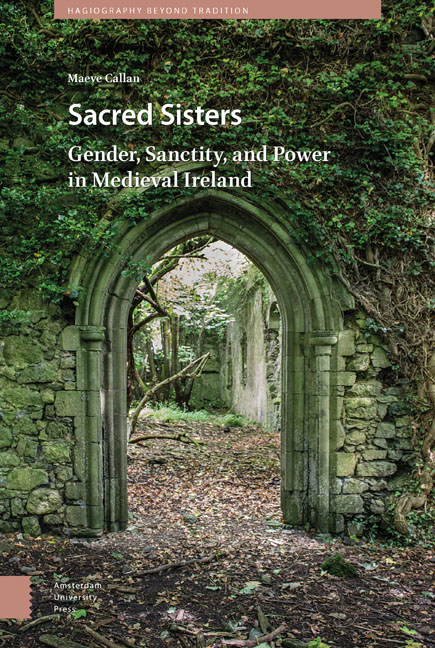Book contents
- Frontmatter
- Dedication
- Contents
- List of Figures
- Preface
- Introduction
- 1 “Founded upon the Rock Which is Christ”: What Patrick and His Promoters Reveal about Women in the Early Irish Church
- 2 “A New and Apostolic Band of Virgins Arose”: Darerca, an Exceptionally Learned Abbess
- 3 “The Safest City of Refuge”: Brigid the Bishop
- 4 “God is Always Present with Those who Exemplify Such Devotion”: Íte, Foster-Mother of the Saints of Ireland
- 5 “Do not Harass my Sisters”: Samthann, an Abbess not to be Crossed
- 6 “I Place Myself under the Protection of the Virgins all Together”: Sister Saints with Something Like a Life
- Conclusion
- Appendices
- Appendix A The Sites
- Appendix B The Sources
- Appendix C Feast Days of Early Medieval Irish Female Saints
- Appendix D Glossary
- Appendix E Pronunciation of Personal Names
- Bibliography
- Index
2 - “A New and Apostolic Band of Virgins Arose”: Darerca, an Exceptionally Learned Abbess
Published online by Cambridge University Press: 24 November 2020
- Frontmatter
- Dedication
- Contents
- List of Figures
- Preface
- Introduction
- 1 “Founded upon the Rock Which is Christ”: What Patrick and His Promoters Reveal about Women in the Early Irish Church
- 2 “A New and Apostolic Band of Virgins Arose”: Darerca, an Exceptionally Learned Abbess
- 3 “The Safest City of Refuge”: Brigid the Bishop
- 4 “God is Always Present with Those who Exemplify Such Devotion”: Íte, Foster-Mother of the Saints of Ireland
- 5 “Do not Harass my Sisters”: Samthann, an Abbess not to be Crossed
- 6 “I Place Myself under the Protection of the Virgins all Together”: Sister Saints with Something Like a Life
- Conclusion
- Appendices
- Appendix A The Sites
- Appendix B The Sources
- Appendix C Feast Days of Early Medieval Irish Female Saints
- Appendix D Glossary
- Appendix E Pronunciation of Personal Names
- Bibliography
- Index
Summary
Abstract
Darerca's Lives demonstrate the diversity of early medieval religious Irishwomen's experiences. The religious life was open to women of various social classes and to wives and mothers as well as virgins and widows. Women could be both students and teachers, studying with women and men, travelling throughout Ireland to pursue the religious life as they deemed fit, or living as solitaries in the wild. Her Lives make manifest the harmony of women's communities and the bonds between women’s monasteries and between women and men, as well as some discord. The threat her community presented to multiple males testifies to the power and wealth women's communities could attain, yet her actions show how little she cared for worldly gain. Darerca prioritized women's access to the religious life, regardless of background. Killevy's continued existence from the fifth century through Viking attacks and other catastrophes up until the sixteenth-century Protestant Dissolution demonstrates her success.
Key words: education, virago, sisterhood, pilgrimage
Virtually everyone in the western world has heard of St Patrick, many have heard of St Brigid, but St Darerca is relatively unknown outside of the ruins of her most lasting community, Killevy (Cill Sléibe, meaning church of the mountain) in south Armagh. Yet her Life may be the oldest known biography of an Irish saint, although it survives only in much later recensions. As Liam de Paor has noted, of all hagiography, including the Lives of Patrick and Brigid, Darerca's provides the most accurate glimpse into the earliest history of the Irish Church. It reveals a world of powerful women with a range of options available to them, of close associations between the sexes while prioritizing sisterhood, and of the commitments for which Ireland became famed as the land of saints and scholars. The oldest of Ireland’s female saints with an extant medieval vita, Darerca died at an advanced age in 517 or 519 and is said to have been consecrated by Patrick himself. She was a pioneer for women's right to pursue the religious life and established the first monasteries for women in her homeland in Counties Louth and Armagh, which may have been among the earliest examples of monasticism of any kind in Ireland. In addition to her piety, humility, generosity, and compassion, Darerca is particularly celebrated for her intellectual abilities, rigorous asceticism, and arduous manual labour.
- Type
- Chapter
- Information
- Sacred SistersGender, Sanctity, and Power in Medieval Ireland, pp. 61 - 84Publisher: Amsterdam University PressPrint publication year: 2019



